Posts Tagged ‘Refugee Resettlement’
Grounded in God’s Vision: Q&A with Aerlande Wontamo
In January 2023, we welcomed Aerlande Wontamo as World Relief’s new Senior Vice President of U.S. Programs. She recently sat down with us to share how her professional expertise, personal experience and strong sense of calling have uniquely prepared her for this role.
We hope you enjoy hearing from Aerlande as much as we did!
Can you start by telling us a little about yourself and your story?
I’m originally from Ethiopia but grew up in Nairobi, Kenya. Due to a political crisis, my father went to Kenya as a refugee. A little over two years later, my two siblings, mother and I followed. The separation at a young age and understanding what that meant for my mother as the sole breadwinner who was managing three young kids made a profound impact on me.
In Nairobi, my parents had other refugees over for lunch and dinner every Sunday after church. It wasn’t so much that they needed a meal, but that they needed to not think about being a refugee for one afternoon. The integral role of the church and the impact those interactions have on people was something I deeply understood and drew me to World Relief.
You have almost 15 years of experience in refugee resettlement. What have you learned along the way?
We set people up well when we walk alongside them in intentional community and provide wraparound services. However, one of the biggest red flags I’ve seen over the years is the mentality of saviorism. It’s crucial to acknowledge that while refugees may carry the label “refugee,” it doesn’t encompass their entire identity. They bring a multitude of skills and experiences, and our lives are often enriched through our interactions with them.
What do you think sets World Relief apart?
At World Relief, we look at what we do not just as good work, but as a space we are called to be in as Jesus would be. Grounding ourselves in our biblical mission helps us understand that we’re part of God’s big picture and vision.
An important question I like to ask is, “Where does your joy come from, or what grounds you?” If it is in accomplishments like getting a grant or opening an office, that’s very fleeting. I find deep joy in being called to this work because it is truly a privilege to be part of God’s work.
We talk a lot about building welcoming communities. Why is that important?
That’s really a personal value for me — as a human, I need community to thrive. But community is not birthed out of just being in a space. There’s an intentional, relational investment.
I think about a client I had who was a single mother with three kids under seven. We matched her with two volunteers who, every Saturday, would take her kids to dance class because they had so much energy. But once their six months of volunteering ended, they continued to meet with her and became family, not because they needed to do things to help her be successful, but because they extended friendship to her and her daughters.
World Relief has been resettling refugees and serving immigrants since the 1970s, but you’re the first SVP of U.S. Programs who has lived experience as a refugee. How does that shape the way you lead?
I have grown up in this system in terms of both a lived experience and a professional career, and this is deeply embedded in my DNA. Growing up in a church filled with a transient refugee community informs who I am and how I hold space.
I’m a huge believer in diversity and all aspects of it. I think about women’s representation, people of color, immigrant voices, people with lived experiences. There are so many categories that we can pull from, but we must come from the mindset of, “this allows us to build a greater group,” versus thinking, “now I have to check off this item.” As an organization, it takes boldness to move in that direction, and there’s so much value that can come out of it.
Where do you see World Relief’s U.S. programs headed in the next year?
I always say, “If not us, then who?” Programmatically we have resettled about 9.3% of the refugees arriving in the U.S. every year. If 125,000 refugees come in this year, we are looking at resettling around 13,000. Growth is integral — we must look at investing in new ways of supporting churches and communities who want to walk alongside refugees and other immigrants and in building more sustainable models that set up our offices to be successful.
Now to end on a fun one — do you have any hidden talents?
That’s the hardest question of all! I enjoy a good baking challenge. Recently, I made French macarons, not sure if it’s a talent yet — but maybe one day!
Want to learn more about how World Relief’s U.S. Programs are creating change in the lives of refugees, other immigrants and the communities that welcome them around the country?
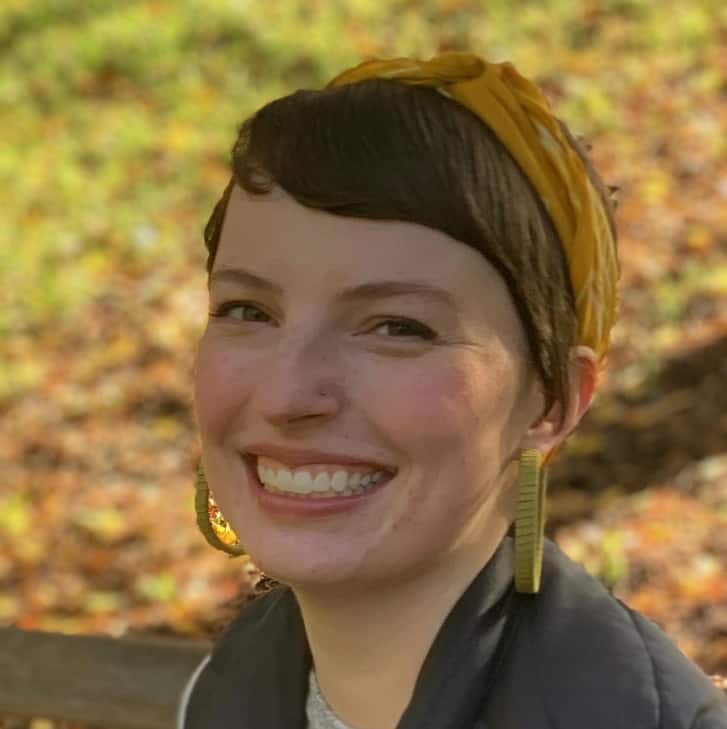
Meghan Gallagher is a Seattle-based freelance content writer and strategist. She has a B.S. in Marketing Management and a background in digital marketing for healthcare, nonprofit, and higher education organizations. When she’s not writing, you can find her working as a local bookseller and enjoying all the Seattle area has to offer.
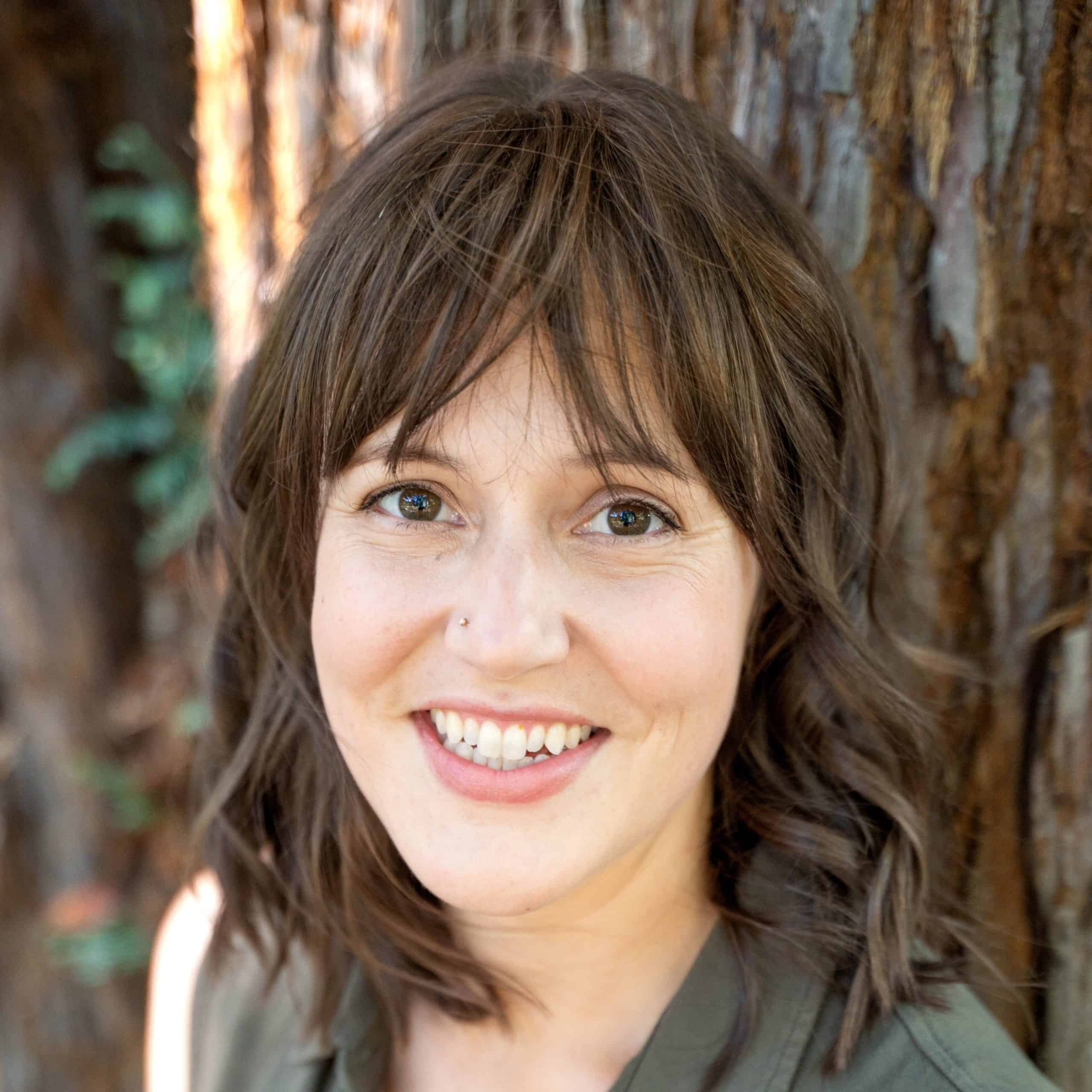
Kelly Hill is the Senior Content Writer at World Relief. She previously served as Volunteer Services Manager at World Relief Triad in North Carolina. With a background in International and Intercultural Communication, she is passionate about the power of story to connect people of diverse experiences.
The Drivers of Mass Displacement: Ukraine and Beyond
Nyakaar abandoned her home in South Sudan when armed conflict threatened her village. She found safety in the Bentiu Protection of Civilians camp, a U.N.-run camp for internally displaced South Sudanese people where World Relief operates health and nutrition programming. Shortly after arriving, Nyakaar gave birth to her son, Bone.
In the world today, a record-breaking 117.2 million people have been forced to flee their homes. That’s about 1 in every 78 people that live across the globe.*
While many of us think of refugees when we hear the words “mass displacement,” the majority of displaced people worldwide are actually internally displaced people like Nyakaar and Bone.
The causes of mass displacement are many, and the repercussions reach far and wide. Today, we’re taking a bird’s eye view of the topic of mass displacement to help you understand what causes people to leave their homes, who is fleeing and how people across the globe are joining World Relief to address the drivers of mass displacement and care for those who are displaced.
*These numbers reflect the latest estimates from the U.N. High Commissioner for Refugees. This blog was originally written May 10, 2022 and updated on April 11th, 2023.
What causes mass displacement?
People are displaced from their homes for myriad reasons — persecution, conflict, violence, human rights violations and climate-related factors to name a few.
The Russian invasion of Ukraine has been the most recent example of how war can force millions of people to flee their homes. However, there are many other conflicts and crises occurring in the world which are also causing people to flee their homes.
For example, violence in the Darfur region of Sudan has caused many to flee in search of a safe place to live, farm and raise their children. Some of these families remain internally displaced while others have fled across international borders into Chad and other surrounding countries. Apart from the unfolding crisis in Ukraine, 68% of the world’s refugees have come from the following five countries: Syria, Venezuela, Afghanistan, South Sudan and Myanmar. Though crises like these have received varying levels of media attention, the needs of the displaced remain critical.
Refugees, Asylum Seekers and IDPs
Many times, displaced people flee to regions or countries surrounding their home region, while a smaller percentage relocate to a more distant country. A displaced person can fall under several categories:
- Internally Displaced People
- Refugees
- Asylum Seekers
Internally Displaced People make up the largest category. These are people who have been displaced within their own country. They have been forced to flee their home and region, and have resettled in a different part of the same country in which they already lived. Currently, 61.2 million people are classed as Internally Displaced People.
Refugees make up the next largest group of displaced people. These are people who have fled war, violence, conflict or persecution and have crossed an international border to find safety in another country. It’s likely that you’ve read stories of refugees like Bohdan, Abdinasir and Amira — all people who left their home countries due to conflict or persecution, applied for refugee status and were resettled right here in the United States.
Today, there are about 29.3 million people with refugee status in the world.
In 2022, the U.S. has agreed to resettle up to 125,000 refugees plus an additional 100,000 Ukrainians who have fled the Russian invasion. As is evident, there are far more refugees in the world than can be resettled even in a country as large and as resourced as the U.S.
Asylum seekers make up the third and smallest category of displaced people. These are people who have fled to another country, but who have not yet been granted official refugee status. These women, men and children may have to wait years to receive an official status.
Currently, there are about 5.6 million asylum seekers living around the world today.
Host Communities
One final impacted group remains to be identified, and these are the host communities.
Host communities have not been displaced from their homes, but the swift influx of refugees into their communities severely impacts those who already lived in the region. Often host community members need the same support that refugees, asylum seekers and internally displaced people typically receive.
A large number of refugees can mean reduced access to land and water and can cause a scarcity in resources. For example, in Sudan, conflicts have broken out over land usage, as host communities and displaced people seek to utilize the scarce land and water resources available in the host community area.
World Relief works within these communities to increase access to clean water as well as facilitate peace committees to solve interpersonal conflicts before they grow.
What else is World Relief doing to help?
After a person is displaced, they can either choose to return to their home, or they can resettle in a new location. However, for many, the option to return home is not a viable one, as drivers of displacement often last for generations. World Relief is currently serving displaced people across the globe in several ways:
- In DR Congo, a country that’s facing one of the world’s worst hunger crises, World Relief works with host communities and with displaced people who have returned home by providing agricultural training and farming supplies to help families grow crops to feed their families and sell the surplus in local markets to earn an income.
- Globally, World Relief serves refugees who have crossed the border into our international countries of operation, working with local partners to provide emergency aid to families living in temporary shelters.
- In the U.S., World Relief partners with the U.S. government to resettle refugees. We also serve asylum seekers and other immigrants by providing community connections, legal services and other vital services like ESL classes, job training and more.
- In Sudan, South Sudan and DRC, World Relief serves internally displaced people by equipping local village peace committees and providing health, nutrition, WASH, education, agricultural programming and more.
- World Relief also advocates for the vulnerable when injustice occurs. We believe speaking up along with the poor and oppressed is an important witness to a watching world about the character of Jesus.
Mass displacement remains one of the largest and most challenging crises of our time — a truth that will take intentional coordination and investment between local and international communities, churches, governments and non-profit organizations to address.
At World Relief, we believe Jesus came to earth to love the vulnerable. Jesus didn’t bring hope and salvation from a distance. Instead, he came to us, showed us love and suffered with us. Whether we are welcoming refugees and asylum seekers into our own communities or providing relief to those displaced overseas, we get to be the hands of feet of Jesus, sharing his love to a world in need.
To learn more about how you can help refugees and displaced people in the U.S., visit our private sponsorship page.

Lydia Dawson served as World Relief’s Humanitarian and Disaster Response Unit Program Officer in Sudan, and in disaster response worldwide. Prior to joining World Relief, Lydia worked in homeless services and community development in Oregon and California. She is passionate about equity and honor for underrepresented groups, both locally and internationally.
“When You Cook, You Have To Cook From Your Heart”
OPENING THE COMMERCIAL TEACHING KITCHEN IN KING COUNTY
Several years ago, World Relief Western Washington (WRWW) hosted a listening session where the local refugee-immigrant community could gather and openly share their needs, struggles, and hopes. What resulted was a dream we decided to help make a reality. With the support of funding from King Conservation District, The WA Commerce Department, the U.S. Small Business Administration, private donors, and generous architects and construction crews, we constructed a commercial teaching kitchen. Soon the 1,215 sq. ft. commercial teaching kitchen will be complete and open for programming including cooking and nutrition workshops and a food industry career pathway course!
Cooking is important to us. We learned this as we listened to the community. Through food we build community, sharing in each other’s joys and sorrows, and inspiring dreams as we nourish our bodies. Listen long enough to the stories of the people around you, and you will see this too.
“When you cook, you have to cook from your heart.”
—Cooking advice shared by a recent arrival from Afghanistan who loves experimenting with traditional recipes and cooking for his friends and family.
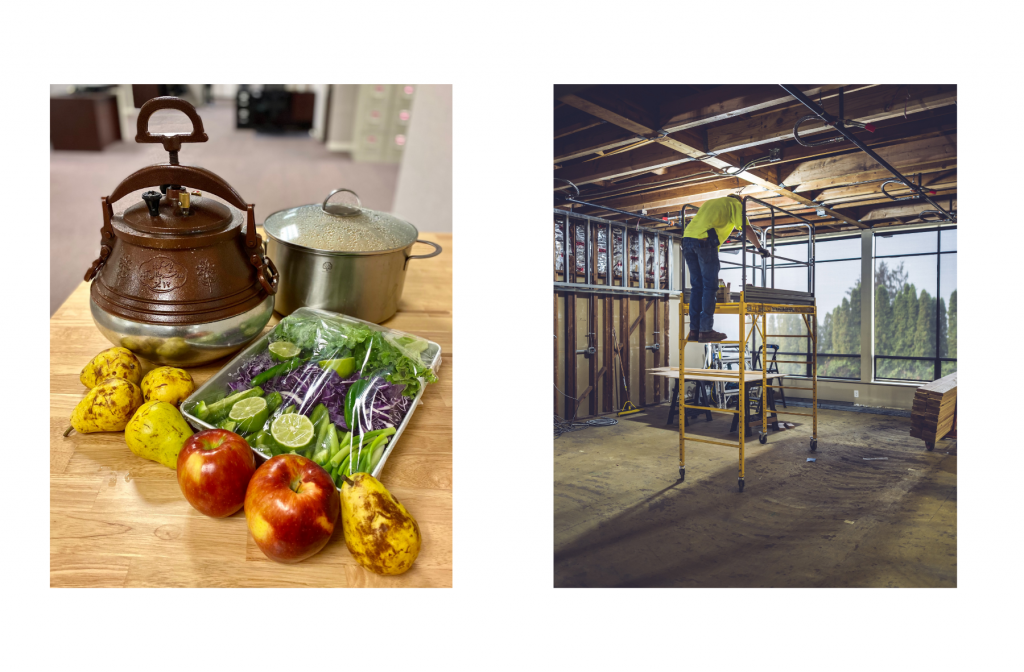
A KITCHEN TO GATHER PEOPLE
“I love to bring joy to people with my baking,” says Katya, a new arrival from Ukraine. “You become a part of people’s special events [when you bake food for them]. You become a part of the joy.” Katya owned a catering business back in Ukraine. Here in the US, she has found joy in preparing baked goods from recipes passed down from her grandmother. Her baked goods tell a story of her family and her homeland of Ukraine. Katya dreams of one day opening a bakery here in the US so more people can share her joy.
We are excited for Katya to be one of our featured guest chefs this summer in a series of cooking workshops hosted by WRWW. Through refugee and immigrant-led cooking classes, community members will have the opportunity to gather, learn from our new neighbors, and celebrate the diversity of our community. Through food we can appreciate the many cultures that shape our growing community.
Our food tells a story about where we are from and who we are now.
A KITCHEN TO BRING NOURISHMENT
Pausing to prepare food and eat reminds us of our human need. Our need for food is not undignified in its existence, but a sacred reminder of our humanity and our beautiful calling to nourish mind, body, and soul daily.
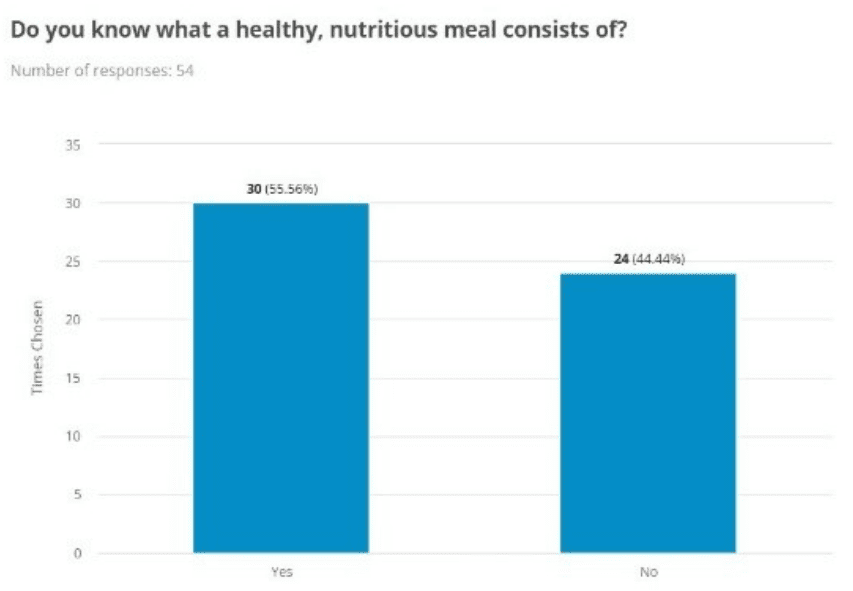
How we respond to our needs matters. The food we eat matters.
According to a May 2023 survey conducted by WRWW, a high percentage (approx. 44%) of refugee & immigrant respondents indicated that they do not know what a healthy, nutritious meal consists of.
The WRWW Commercial Teaching Kitchen will offer nutrition classes and healthy cooking workshops, equipping refugees and immigrants with the knowledge and skills they need to prepare nourishing food for themselves and their families.
Healthy food brings our bodies strength, healing and vitality.
A KITCHEN TO INSPIRE DREAMS
Refugees and immigrants arriving in Washington have left much behind. But they also bring so much with them. They bring pieces of their culture, creativity, ambition, skills and dreams. They come with so much to offer to our community.
World Relief Western Washington believes in the inherent resiliency of refugees and immigrants and is committed to coming alongside the refugee-immigrant community to equip them to thrive in their new home. Developing cooking skills and building knowledge and connections within the food industry provides refugees and immigrants with more opportunities for employment and creative economic endeavors. Programming won’t only focus on the culinary arts or business pathways. Workshops will be designed in such a way as to draw out creativity, instill confidence, and inspire dreams both new and old.
With the completion of the WRWW Commercial Teaching Kitchen we celebrate the realization of one dream and look forward to the start of many more!
Thurston County Hosts “From Home to Home” Refugee Resettlement Simulation Event
In recognition of the thousands of refugees who are forcibly displaced from their home countries each year, the Thurston County office of World Relief is hosting “From Home to Home” – an experiential exhibit demonstrating the challenges these refugees face when coming to the United States. The event will take place in Olympia on May 19 – May 22, with sessions available both for groups and individuals from 8:00 a.m. to 7:00 p.m. at 812 Central St SE. Sessions in the exhibit will simulate the common decisions and difficulties refugees and asylum seekers face on their journey to resettlement.
“Refugees and asylum seekers who are forcibly displaced from their homes have experienced challenges and dangers that many of us cannot begin to comprehend,” said Annie Frisbie, Director of Strategic Advancement. “Through this exhibit, we hope to create awareness of both the trauma of displacement and the difficulties they endure on their journey to the United States. By doing so, we can better work together as a community to ensure those who have experienced such difficulty can find support in Thurston County.”
Through this exhibit, the Thurston County office of World Relief is aiming to increase understanding of the unique vulnerabilities of refugees and asylum seekers who have been forcibly displaced and highlight the need to assist them in rebuilding their lives in the United States. This exhibit to increase awareness is coupled with the office’s continuing work serving displaced individuals in Western Washington by assisting them in securing safe housing and providing cultural orientation services.
“Refugees and asylum seekers need our support to both navigate an unfamiliar culture and an uncertain future in their new homes,” said Annie Frisbie. “They have suffered significant challenges before and during their journey here, but our community has an opportunity to demonstrate God’s love for them by welcoming them with open arms and helping to ease their transition to rebuilding lives in the United States.”
Schools, local businesses, first responders, faith groups, and individuals are all encouraged to participate in the exhibit. To register for this event as a group or an individual, please visit the World Relief Western Washington “From Home to Home” events page and reserve a spot: https://worldrelief.org/from-home-to-home
Was Jesus a Refugee?
“Jesus Was a Refugee.” Recently, I’ve seen that message all over — on billboards, TV ads, on t-shirts, debated on social media and beyond. Much of this messaging is part of a broader campaign called He Gets Us that aims to help people recognize that Jesus was a human being who can identify with us in our humanity.
That’s a powerful reality for the more than 32 million refugees in our world today, a number unprecedented in recorded history. Jesus “gets” them because, early in his human experience, the Gospel of Matthew tells us that he was forced to flee the threat of Herod’s persecution. He was carried by Joseph and Mary to Egypt, beyond Herod’s dominion, where they would be safe from the genocide inflicted by a jealous ruler on the little boys of Bethlehem.
Many of today’s 32 million refugees know viscerally what it means to awaken in the middle of the night and to flee with what little they could carry, as an angel instructed Joseph to do. To feel danger just behind them. To complete a grueling journey only to arrive in a new land and a new culture with the ongoing grief of the loss of one’s homeland. Jesus presumably lived all of that in his fully human flesh as a small child. And millions today find solace in that reality. He gets them.
But was Jesus really a refugee?
We now have formal legal definitions for the term “refugee” in both U.S. and international law: refugees are those outside of their countries of origin who are unable or unwilling to return because of a well-founded fear of persecution on account of their race, religion, political opinion, nationality or membership in a particular social group. But, of course, these definitions did not exist when the holy family made their journey.
Some, especially on social media, have vehemently insisted that Jesus was not a refugee — perhaps defensive at the implication that their preferred refugee and immigration policies to keep most, if not all, refugees out might actually have harmed the incarnate God.
But while it is clear from the biblical text that Jesus was displaced by a credible threat of persecution, it’s fair to ask just how he would fare under our contemporary policies — as theologian Glenn Butner Jr. does in a new book, Jesus the Refugee: Ancient Injustice and Modern Solidarity.
Butner argues that Jesus largely satisfies the contemporary legal definition of a refugee, but it’s debatable whether the journey to Egypt took him “outside of his country of origin,” since Egypt and Bethlehem were both part of the Roman Empire. Perhaps it’s more precise to characterize the holy family as “Internally Displaced Persons” — those, including more than 60 million people in our world today, who have been forced to flee their homes but remain within the boundaries of their countries.
Would Jesus have faced the barriers many families fleeing persecution face today?
Perhaps Jesus was actually an asylum seeker: asylum seekers profess to meet the definition of a refugee. They say that they’re afraid of persecution on account of one of the enumerated grounds — but they’re not ensured protection under the law unless and until they have demonstrated (to the satisfaction of the governing authorities of the country where they hope to find refuge) that they indeed qualify. Sometimes they lack documentary evidence of the credibility of their fear. Would Joseph have cited an angelic message as his evidence that persecution was likely for little boys in Bethlehem? Would that have satisfied an Egyptian immigration judge?
Fortunately for our Lord and Savior and his earthly parents, there’s no evidence in the biblical text that they faced any barriers to finding refuge in Egypt. But the Gospel of Matthew gives us very few details about their experience there. We’re left to speculate: were they welcomed, seen as a potential threat or simply ignored? Did Jesus learn to speak his first words with a different accent than his parents? Did Joseph easily find work, or was he told that he would be “stealing” a job from an Egyptian carpenter?
Decades later, in one of his final sermons before his crucifixion, Jesus commends certain individuals for having welcomed him when he was a stranger. The disciples are confused: “When did we see you a stranger and invite you in, or needing clothes and clothe you?” (Matthew 25:38). They did so, Jesus says, when they welcomed one of “the least of these brothers and sisters of mine” (Matthew 25:40). Jesus identifies himself perpetually with the vulnerable and the stranger — which, at least early in his life, he himself was.
Does Jesus’ story shape how we respond to refugees and other immigrants?
Whether Jesus would satisfy the precise legal definition of a refugee or not, what’s clear for those of us who profess to follow him today is that an unprecedented crisis of forced migration — with more than 100 million people forced from their homes, experiencing displacement similar to what Jesus experienced as a child — presents an unprecedented opportunity to demonstrate love for Jesus himself.
At World Relief, it’s our great privilege to partner with local churches both across the United States and in various other parts of the world to welcome and care for refugees and others who have been displaced. From our U.S. refugee resettlement program’s foundations in the 1970s, we — and the tens of thousands of church-based volunteers who have partnered with us — have resettled more than 300,000 individuals, motivated by Jesus’ challenging words in Matthew 25. As Evelyn Mangham, the cofounder of World Relief’s refugee resettlement program said, the Christian response to an unprecedented global refugee crisis is “simple”:
“Respond to what Jesus said, that’s all: ‘I was hungry, and you gave me something to eat. I was thirsty and you gave me something to drink. I was a stranger’ — refugee — ‘and you took me in… Inasmuch as you did unto of the least of these my brethren, you did unto me.’ It’s simple obedience.”
Are you ready to create a more welcoming and just world for refugees and other vulnerable immigrants? Learn how you can join us today.

Myal Greene has a deep desire to see churches worldwide equipped, empowered, and engaged in meeting the needs of vulnerable families in their communities. In 2021, he became President and CEO after serving for fourteen years with the organization. While living in Rwanda for eight years, he developed World Relief’s innovative church-based programming model that is currently used in nine countries. He also spent six years in leadership roles within the international programs division. He has previous experience working with the U.S. Government. He holds B.S. in Finance from Lehigh University and an M.A. from Fuller Theological Seminary in Global Leadership. He and his wife Sharon and have three children.
9 Things You Need to Know About Private Sponsorship
On Thursday, January 19th, the Biden Administration announced a new private sponsorship program for refugees called Welcome Corps. Through Welcome Corps, everyday Americans can directly sponsor refugees who are being resettled in the U.S.
Today, there are an estimated 103 million displaced people globally, including 32.5 million refugees. Forced from their homes and separated from support networks, refugees are among the world’s most vulnerable populations.
At World Relief, we know you want to live out Jesus’ call to welcome the stranger and care for those experiencing vulnerability. Private sponsorship builds on World Relief and other refugee resettlement agencies’ existing opportunities to welcome newcomers and is one more way you can answer that call. Here are 9 things you should know about private sponsorship.
1. What is Welcome Corps?
Welcome Corps is a new private sponsorship program from the U.S. government that allows groups to sponsor and resettle refugees. Sponsors will play the primary role in welcoming, financially supporting and assisting refugees for the first 90 days as they begin to rebuild their lives in the U.S. and integrate into their new communities.
2. How do I become a sponsor?
Becoming a private sponsor is a multi-step process that includes forming a group of five or more individuals, submitting an application, background checks, demonstration of sufficient financial resources and more. Currently, private sponsors can apply to be matched with someone in need of sponsorship. The U.S. government is also working to roll out an option for people to sponsor specific individuals they already know who are in need of resettlement from another country. To learn more and begin your application process with Welcome Corps, click below!
3. Who is eligible for resettlement through Welcome Corps?
Over the last year, the U.S. government has developed sponsorship programs specifically for Ukrainians and Venezuelans.
This new program expands on the previous sponsorship programs and will be implemented in phases. In Welcome Corps’ first year, the goal is to mobilize at least 10,000 Americans to help at least 5,000 refugees, and then scale up to make the program an enduring feature of the refugee resettlement system.
The first refugees who will be assisted by private sponsors through Welcome Corps are expected to arrive in April 2023 and will primarily come from countries in Sub-Saharan Africa.
For specific information regarding sponsorship for Ukrainians, click here.
For specific information regarding sponsorship for Venezuelans, click here.
4. If I become a sponsor, what will I do?
Sponsors assume responsibility for initial resettlement services, providing financial and other forms of support as required by the refugee resettlement process. Some examples of non-material support include:
- Meeting the refugee(s) upon arrival in the United States and transporting them to initial housing.
- Ensuring that the sponsee has safe and appropriate housing and basic necessities.
- Ensuring that the sponsee’s healthcare and medical needs are met for the duration of the resettlement period.
- As appropriate, helping the sponsee complete the necessary paperwork for employment authorization, a Social Security card and for any other public benefits for which they may be eligible.
- As appropriate, assisting the sponsee with accessing education, learning English and enrolling children in school.
- Supporting employable sponsees in securing employment in the U.S. workforce
- Ensuring appropriate interpretation/translation
- Providing cultural and community orientations
For more information on the sponsorship process through Welcome Corps and what’s required of sponsors, visit welcomecorps.org.
5. Is private sponsorship good for refugees?
Private sponsorship opens more pathways for more people fleeing persecution to rebuild their lives and thrive. At World Relief, we applaud the expansion of sustainable, lawful opportunities for those fleeing persecution to find safety in the U.S.
Navigating the process of private sponsorship can also come with challenges for both sponsors and refugees. But you don’t have to face them alone.
At World Relief, we have decades of experience working with refugees and displaced populations across the globe through our various local community sponsorship and volunteer programs. We utilize this experience to equip churches and passionate people like you to walk alongside those who choose to welcome newcomers and the newcomers they are matched with.
If you are interested in private sponsorship and would like to receive updates on how World Relief can support you in the process, please sign up here. In addition, we will send you a free code for our eLearning course “Navigating Friendships” which will help you learn how to build empowering, long-lasting friendships with those from different cultures. Please see question 8 regarding World Relief’s involvement in private sponsorships. Please see question 9 if you are unable to be a sponsor but want to still make a difference!
6. Has private sponsorship been done elsewhere?
Yes! Private sponsorship has been a successful piece of refugee resettlement efforts in countries like Canada and Australia, and versions of private sponsorship have even been part of U.S. refugee resettlement historically. Most recently, the U.S. has re-engaged private sponsorship models to resettle Afghans, Urkanians and Venezuelans. This new program expands private sponsorship to include refugees from around the world.
7. What about traditional pathways to refugee resettlement? Will refugees continue to be resettled by World Relief and other agencies?
Yes! The U.S. federal refugee resettlement program will continue to operate and World Relief will continue to offer various ways for churches and individuals to engage in welcoming refugees and other immigrants in vulnerable situations. Private sponsorship will complement the work already being done by organizations like World Relief, allowing more people fleeing persecution to find safety in the U.S.
8. Is World Relief assisting with private sponsorship?
Currently, World Relief provides other community sponsorship opportunities — such as our Good Neighbor Team program — through our local office and is not administering the private sponsorship program directly.* However, we do have resources available to serve both sponsors and those being sponsored.
The World Relief Workshop is our e-learning platform designed to equip individuals, groups and churches to best serve their refugee neighbors — from courses on navigating common barriers to ESL tutoring. Many of our U.S. offices are also able to offer services to sponsees such as English classes and immigration legal services.
9. I’m not ready to become a private sponsor. Is there anything else I can do?
Yes! As mentioned, World Relief works with refugees and displaced people in the U.S. and all over the world and offers the opportunity to welcome and walk alongside refugees and other immigrants through local volunteer and sponsorship programs.
You can support this work by volunteering with World Relief Fox Valley or making a donation to World Relief. Your gift will allow World Relief to provide job training, legal support and more for immigrants and refugees in the Memphis area from countries like Ukraine, Afghanistan, Venezuela, Iran, Myanmar and other parts of the world. Together, we can extend welcome and help people rebuild their lives here in the Fox Valley.
Have additional questions?
We will host an information session on Welcome Corps during the week of February 13th. Email wrfvreception@wr.org to learn how to join.
A Look into Casework with Quench
What do you like about your job?
I have a lot of things I like about my job. My job is not just about getting a paycheck but I do it because I like supporting people. I like helping people to get resettled in America and start living a better life. I also like meeting a lot of different people of many different cultures. It is critical for me in my work to get to understand other cultures because I cannot help my clients if I do not know what is important to them.
What are some goals you work on with your clients in their first 90 Days?
The government provides direction for us for goals the first 90 days through the R&P service guide. We also work with the client to help them to accomplish their goals for the first 90 days. The most important goals we focus on are employment, permanent housing, applying for benefits and insurance, doctor’s visits, enrolling children in school, ESL classes for adults, learning how to use public transportation or learning how to drive a car, and getting important documents such as social security.
What do you think are important strengths for a caseworker?
Two strengths that are important for caseworkers are being timely with your work and treating everyone fairly. It’s important to be timely with your work because most tasks must be completed by a certain deadline. Treating people in the way that you would like to be treated is important so that all clients are treated in the same way.
What does an average day look like?
It depends on the day, but most of the days I am busy. A lot of times I call my clients to check in on them about their job or about how their kids are doing in school. Clients call me a lot with many questions at all times of the day. I also do a lot of home visits to take clients to appointments and check in on them. I take clients to the dentist, to get their RCA-refugee cash assistance, and to go to the store. A lot of days my plans change because I have to respond to my clients’ needs.
What is challenging about your job?
Working with people from different backgrounds is challenging because they have different expectations. People expect that I will do a lot for them when I work with many clients so I cannot always do as much as they would like. The clients I work with come from many different cultures and many have experienced trauma, both of these things influence their expectations for life in the U.S. It’s also hard when people speak different languages, but that is usually that is not a challenge because I speak 9 different languages.
What is something that encourages you in your work?
I find a lot of encouragement in my coworkers because I am still learning a lot about being a caseworker. My coworker, Marlo, is so helpful. She’s always willing to stop what she’s doing to help me when I have a question. My teammates don’t pressure in my job but they are willing to encourage and teach me.
How do you think your story impacts your work?
Because I have lived in a refugee camp I can understand what it’s like to come to the US and live in a country that is so different from one’s own. There are a lot of surprises when you arrive to the U.S. It takes time understand life here and I can help and encourage my clients from my own experience.
What is one thing you wish people knew about refugees?
To understand how challenging it is for refugees to learn life in the U.S. Often people expect refugees to respond to life here in a certain way, but for refugees life in the US is brand new. For many people life here is so different than what they are used to; it’s like they are starting their lives all over again.
Churches in Washington are Using Coffee to Change the Lives of Refugees and Immigrants
If you’ve been to Western Washington, you know that coffee is a big deal. Seattle consistently ranks near the top of “best coffee cities in America.” One analysis even found there are 56 coffee shops for every 100,000 people.
Coffee is such a big deal, in fact, that many local churches have fully outfitted coffee shops to meet the caffeine needs of Sunday morning guests. But what if those coffee shops could serve an even bigger purpose — what if they could help welcome refugees and immigrants?
That’s the question Holly Andrews asked herself when she moved to Washington in 2011.
The Seed of an Idea
Holly’s interest in welcoming refugees and immigrants started when she tutored a Somali family in college through World Relief. “It was such a great adventure getting to know [the family’s] culture and language, sharing food together and growing in a trusting relationship,” Holly said.
Inspired by this family’s story and a growing awareness of her refugee and immigrant neighbors, Holly went on to become a teacher for English language learners, eventually completing her masters in linguistics.
Later, while working at Bethel University in Minnesota, she led a study-abroad course in Cambodia where the seed of an idea was planted.
One of the agencies she and her students visited ran a cafe where they provided job training for women survivors of trafficking. “I loved that [the program] gave women a chance to work with dignity and demonstrated the grace of God by meeting them where they were at,” Holly said.
She felt so moved that she even hoped to return to Cambodia to help with the cafe program. But, “God had different plans.”
Barista Training for Newcomers
Shortly after returning from Cambodia, Holly and her husband moved to Washington, and Holly began working at World Relief. She also started attending Calvary Chapel South in Kent. The church had a coffee shop, which reminded her of her time in Cambodia.
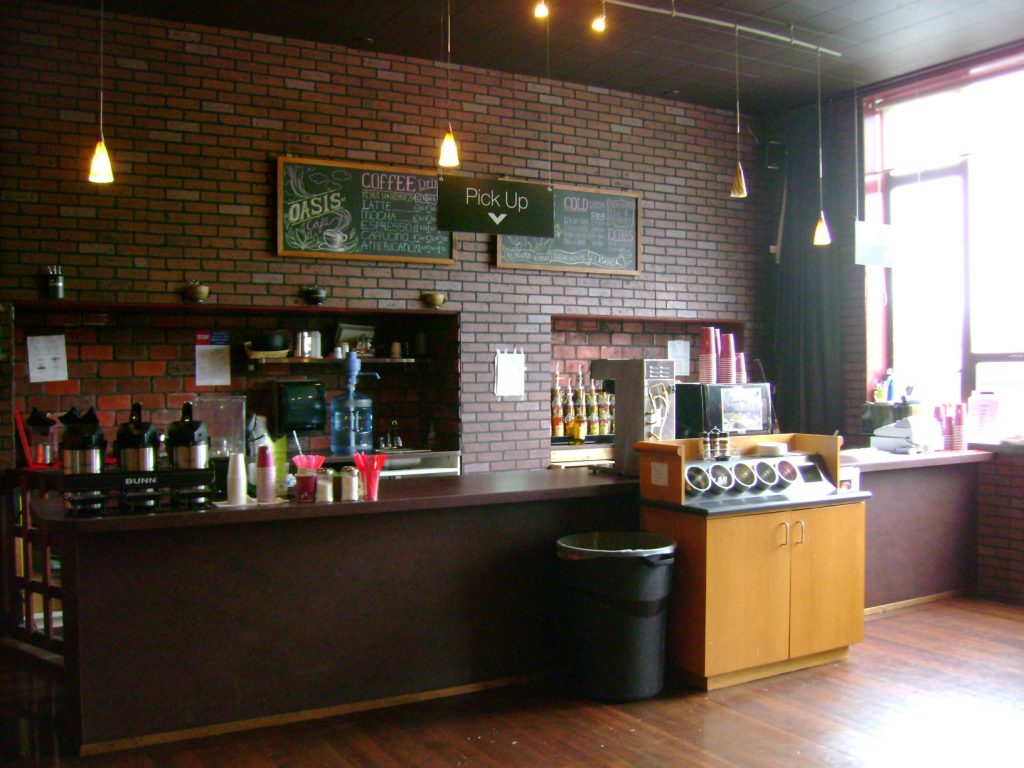
“I thought, wow, this would be a really neat opportunity to partner together — the church and World Relief — and provide some practical training [to refugees].”
Within a year, Holly helped Calvary Chapel South launch a barista training program for newly arrived refugees and immigrants. Since then, Holly has also launched the training program at Brooklake Church in Federal Way, where she now works as the Outreach Director.
Both churches partner with World Relief Western Washington’s Employment Services to identify and refer participants to the programs. So far, the two churches have trained more than 25 refugees.
More Than a Training Program
Much like the Cambodian cafe that first inspired Holly, the barista program in Washington is designed to meet each participant’s individual needs. Focusing on only a few students at a time, training sessions are tailored based on the trainee’s prior work experience and English level.
Participants are enrolled in a 12-week program that takes place every Sunday while church coffee shops are up and running. Each week, participants focus on learning how to run one aspect of the coffee shop, while also practicing their English and customer service skills.
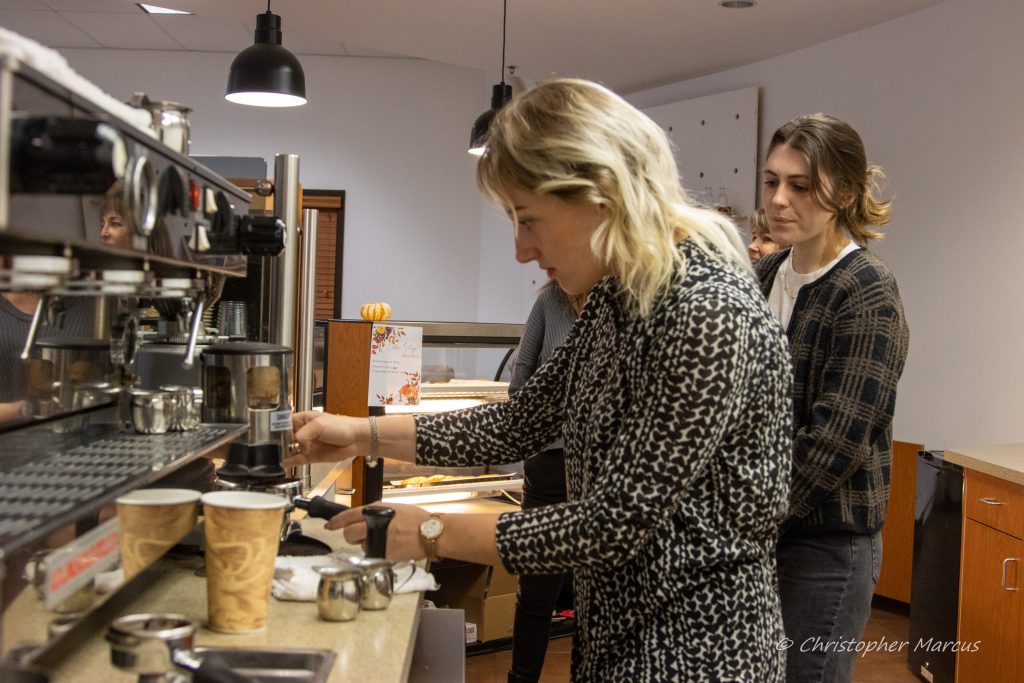
But there’s more to the program than barista skills and English — there’s an opportunity to form friendships. Tutors intentionally leave space for navigating culture and offering encouragement, advice and even prayer when appropriate.
“The churches don’t just help our participants learn new skills,” said Santa Pradhan, Employment Program Manager at World Relief Western Washington. “They also welcome them with open arms and give them a sense of community.”
As tutors help trainees feel like “less of a stranger,” trainees help tutors expand their understanding of refugees and immigrants and clarify misperceptions. “Our participants have been instrumental in helping the church to be better at following God’s call for us to welcome the stranger,” Holly said.
As participants and volunteers become invested in one another’s lives, many form friendships that last long beyond the end of the program.
Careers Beyond Coffee
This was the case for Hawraa. After resettling in the U.S. from Iraq, she joined the barista training program in early 2016. Today, Hawraa remains friends with Holly and the volunteers from Calvary Chapel South’s coffee shop training, and she credits the program with teaching her more than barista skills. She also learned customer service and how to interact with others in a U.S. workplace, lessons that would carry her career beyond the coffee shop.
“[The barista program] was the first thing that I participated in that was close to a job when I first came to the United States. It prepared me for bigger things that I went on to do,” she said.
Hawraa is now working as a case manager with Puget Sound Training Center, helping other refugees, immigrants and under-served populations achieve career success in the U.S.
When asked what advice she would give to U.S. churches hoping to welcome refugees and immigrants, she said, “Please offer them participation in programs and events, help them as much as possible with their English since most are too embarrassed to make mistakes, and just smile! Seeing smiling, welcoming faces was one of the best things when coming to the United States.”
Why the Church?
Like World Relief, Holly believes the church is called to embody the hope of Jesus in the midst of a hurting world. One of the ways churches in the U.S. can do that is by welcoming new immigrants into their communities and seeking to learn from one another.
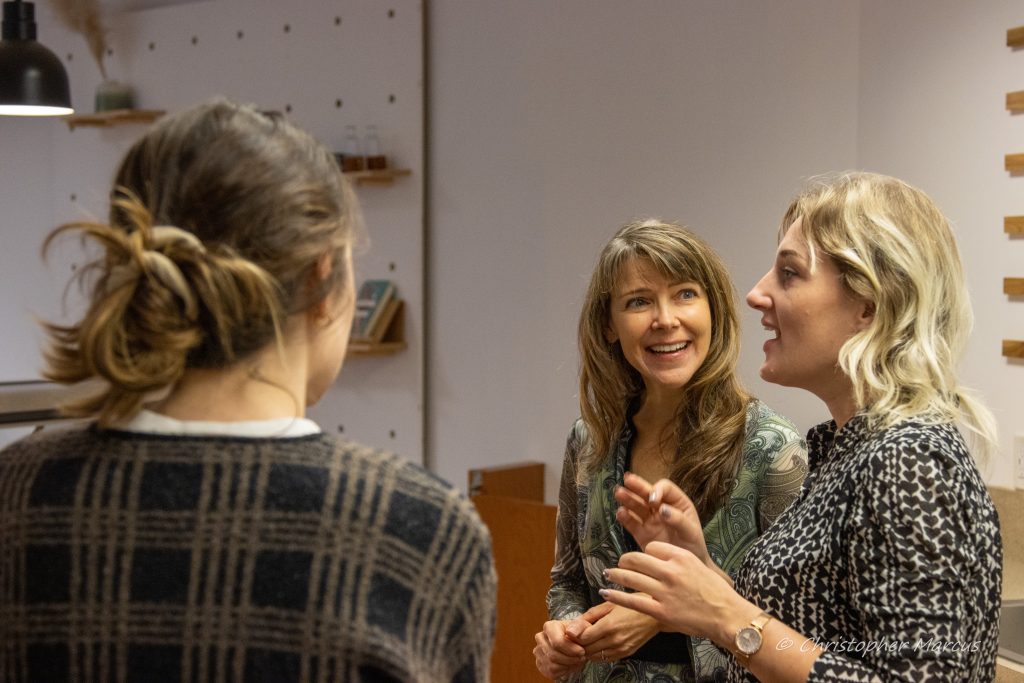
“We see in the establishment of the early church, God’s design… is for people to come together, pour over his Word and to fellowship with one another in a deep and devoted way,” she said. “How amazing when the local church can enfold newcomers into this kind of community.”
For churches not yet connected with refugees and immigrants, Holly suggests first discovering who is already providing services for refugees and immigrants, including established immigrant communities. Work together to determine how best to be a supportive partner in the resettlement process.
She also recommends taking note of what your church already has that might help in welcoming someone who has recently arrived in the U.S.
While not every church has a full coffee shop, others may have shuttles available to provide transportation to local thrift stores or markets, or business owners from local churches might host a small job fair. English tutoring, access to computers, job search assistance and fun after-school activities can also make a big impact.
But most importantly, Holly emphasizes the value of friendship as we seek to create more welcoming communities where everyone can thrive.
“The church can first and foremost be a friend,” she said. “Rest from ‘doing’ and leave room for just being together, sharing life and learning from one another. Be hospitable and accept hospitality. This is a ministry in itself.”
Want to be a part of creating lasting change for refugees, immigrants and people experiencing vulnerability around the world? Learn how we’re moving forward together.
If your church is ready to dive deeper into how best to love and welcome your refugee and immigrant neighbors, check out The Workshop, World Relief’s e-learning platform. Use code CHURCH25 for 25% off through January 31, 2023.

Kelly Hill serves as a Content Writer at World Relief and previously served as Volunteer Services Manager at World Relief Triad in North Carolina. With a background in International and Intercultural Communication, she is passionate about the power of story to connect people of diverse experiences.
Resiliency & Hope in the Midst of Persecution
Fleeing Persecution in Cambodia
When Sithy and his wife, Saobot, arrived in the United States in March of 2022, he was not sure what his life would look like. He had been rejected, persecuted, and imprisoned for his political affiliation in Cambodia.
Both Sithy and Saobot’s siblings and other family members remain in Cambodia. While they do not have any relatives here in the United States, they have already found solace in his neighbors – both those who partner with World Relief Triad and the Cambodian community that surrounds them.
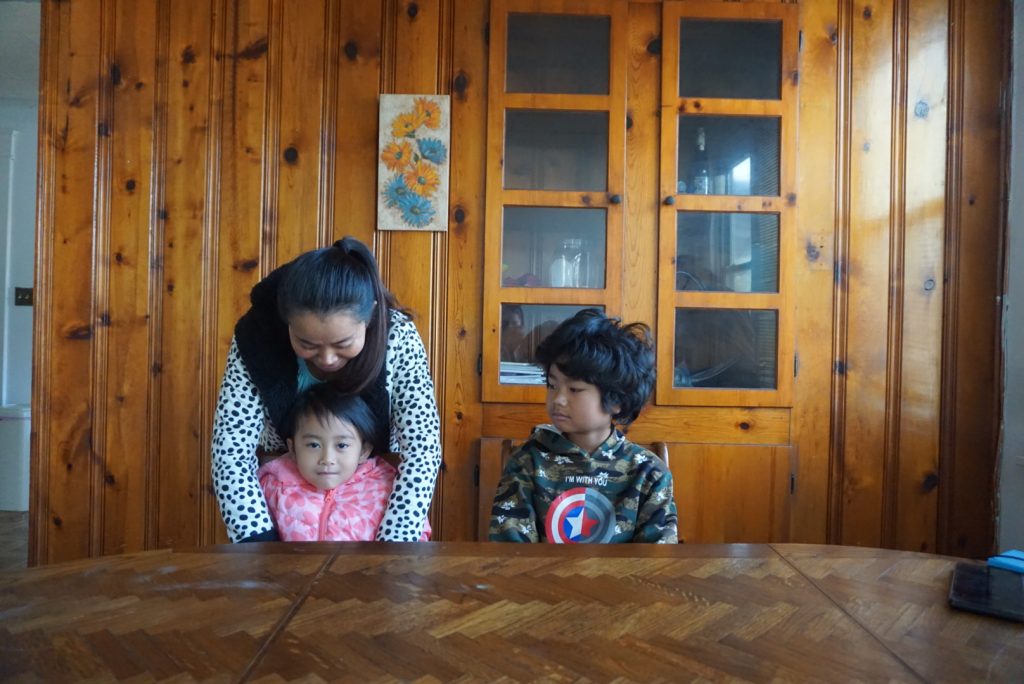
“My friends from the Cambodian community know my story of why I’m an immigrant,” Sithy says. “I’m a refugee because of political issues. When I was in Cambodia, I was captured and put in prison. They were pressuring me to live there. After I fled to Thailand, people followed me and tried to capture and kill me.”
He recalls the way that it felt to finally be in Thailand but not in full safety yet. “When I left Cambodia, I didn’t have any hope,” Sithy says.
“When I was leaving Thailand, I had even less hope. I felt like I was floating in the middle of the sea.”
Finally, when Sithy arrived in the United States with his wife and children, he gained a hope that he had never thought possible. “Right now, I’m happy,” he says. “I have freedom with the hope that I live in a democratic country like the United States.”
Life After Arriving in the U.S.
It is no wonder that Sithy “hit the ground running” once he finally was able to begin his life in the United States. Within weeks of adjusting to his new home, Sithy began working for two different people. He also received some extra funding from World Relief which covered some of his rent and utilities easing the burden of housing costs.
With the money saved, combined with the money given to him by friends in the local Cambodian community, Sithy was able to pay for his first car. Now that Sithy has hope and stability in his life here in the Triad, he has already begun to make plans for his family.
“For myself, I need to find permanent work,” he says. “I know I will have help from World Relief and the community in the process of finding the right job for myself and my wife. I want her to continue her studies, and I plan to try and meet the GED requirements because the certificate I have from Cambodia isn’t eligible here without a high school degree.”
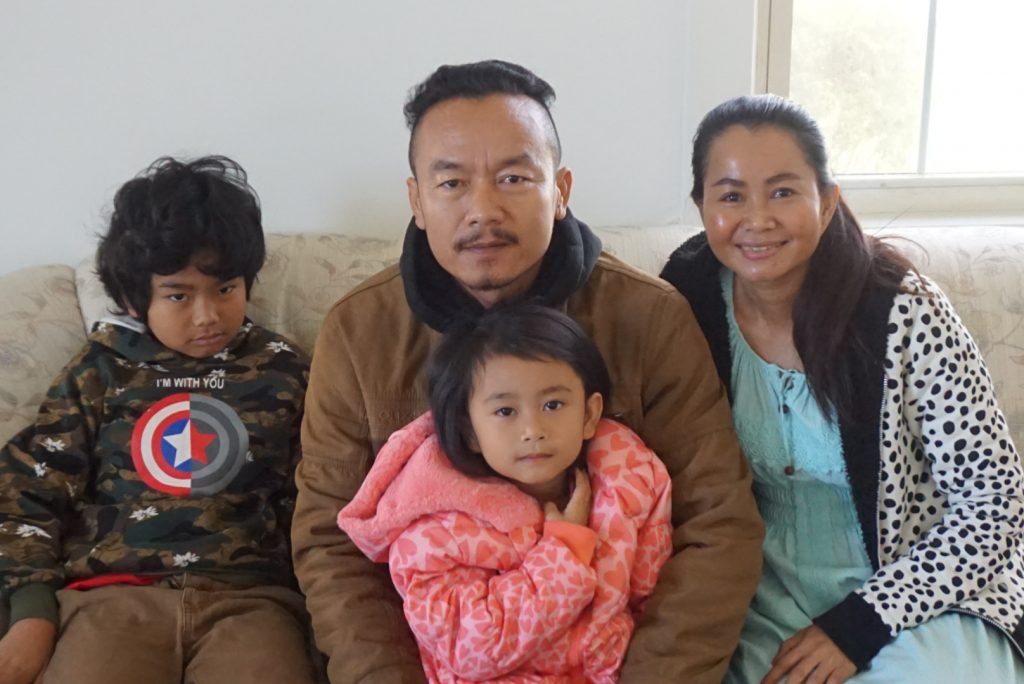
Sithy can now use his own car to transport himself and his wife to various ESL classes, personal appointments, and eventually their future places of employment! Because of supporters like you, World Relief Triad was able to ease housing costs through locally raised funds, giving newcomers like Sithy the ability to pay for and provide his own transportation for himself and his family.
Let’s Go Together for Those Who Have Yet to Come
Over the past two years, our office has faced many challenges. In the midst of a global pandemic, a new administration led to a large influx of arrivals which forced our office to ramp up in staff members, an ongoing war in Ukraine, and the fall of Kabul which ultimately led to thousands of Afghans being forced to flee their home country. Yet, our community remained to be a sanctuary for the displaced.
We invite you to join us as we cast a new vision, together, as we go forward into the reality of an uncertain future. When you give today, you join World Relief Triad in going further than we’ve ever previously dreamt possible.
Together, we can welcome more, like Sithy and Saobot, into a world of restored hope, peace, security and joy.
Breaking Down Barriers: How Autism Has Helped Me Serve My Refugee Neighbors
I’ve lived in the same place my whole life. I have never had to leave everything I know out of fear for my life. In many ways, my life and the lives of my refugee and immigrant neighbors couldn’t be more different.
Yet, I do know what it feels like to be on the outside looking in. For as long as I can remember, I have felt somewhat out of place, like I wasn’t meant for this world in some way. I didn’t know the reason for this — it was just the way I was.
It wasn’t until I was 20 years old that I finally realized why I felt so out of place. That’s when I first heard, “You have autism.”
On one hand, I was relieved. I finally had an answer for why I felt like a person who was told to play the game without being given the rules. On the other hand, it expanded my understanding of just how much our society is not built to accommodate people like me.
Fighting the battles that come along with having autism has been difficult, but it’s also afforded me a unique love for learning from those whom society often relegates to the margins. Over the years, this has meant seeking to be mentored by African American pastors, working with the imprisoned and searching out opportunities to see how my Christian faith intersects with building up my local community.
In college, I was introduced to this type of ministry when I had the opportunity to work with refugees as an ESL tutor. For me, this felt like a natural extension of my passion for reflecting God’s love to those on the margins. Years later, through God’s providence, I was given the opportunity to continue serving refugees when I joined the World Relief Upstate SC team right here in my own community in South Carolina.
Now, in my role as the Upstate SC Mobilization and Development Coordinator (and formerly as the Church and Volunteer Engagement Coordinator), my life is full of paradoxes. I am a person who struggles with social interactions, but I must frequently speak to volunteers, churches and other community partners about how we are called to love and serve refugees. Accepting unpredictability and ambiguity does not come naturally to me, yet refugee resettlement is anything but predictable.
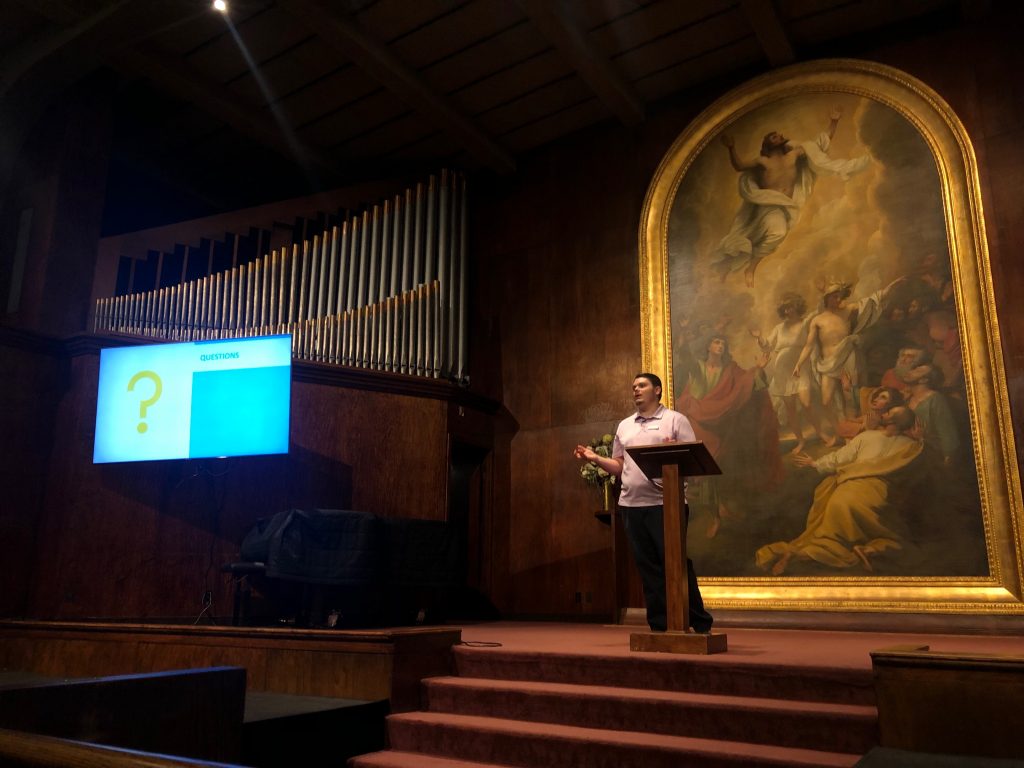
While these are paradoxes, they show that God uses every single person to advance his cause and that his kingdom breaks down barriers of gender, race, ethnicity and even disability. In fact, because of my disability, I believe it can sometimes be easier for me to put myself in the shoes of refugees and immigrants who are feeling out of place and lost in a culture and society that wasn’t built for them.
For many refugees and immigrants, navigating new communities, grocery stores, school systems, workplaces and more can feel like trying to put a puzzle together without knowing what the finished product should look like. That’s a feeling I can certainly relate to.
My experience with autism spectrum disorder also gives me compassion for the fear and uncertainty that many of our refugee and immigrant neighbors face in their daily lives. I understand what it means to cling to Matthew 6:34, which says “do not worry about tomorrow, because tomorrow will worry about itself.”
While I do not discount the many challenges people like me face or the differences between my experience and that of refugees, I do believe wholeheartedly that the good news of God transforms even the most difficult of situations for our good and his glory.
At World Relief, I’ve found a place where I can work within my strengths and limitations as someone who has autism and experience God’s transformation in my life and in the lives of those around me.
World Relief is committed to building welcoming communities that value and accept refugees and immigrants. That same culture has helped me feel valued and accepted. Our Office Director, Brandon Baughn, has been an especially faithful example of this culture of welcome, giving me the blessing of trust in my work and in my perspective not only as someone with autism, but more importantly, as a follower of Christ who is passionate about serving “the least of these.”
This trust has allowed me to run headlong into serving churches and volunteers so that they, too, can create communities of welcome. I am able to do my work knowing that World Relief welcomes my unique perspective and does not see my disability as a hindrance.
Together, we are moving towards creating spaces where people of all nations, backgrounds and abilities can embrace their God-given purpose and live out their full potential.
At World Relief, we are grateful for faithful staff like Austin. We rely on the time, talents and treasure of people like you to continue moving forward together. You can join us by giving today or by checking out our careers page to see if working at World Relief is a good fit for you.
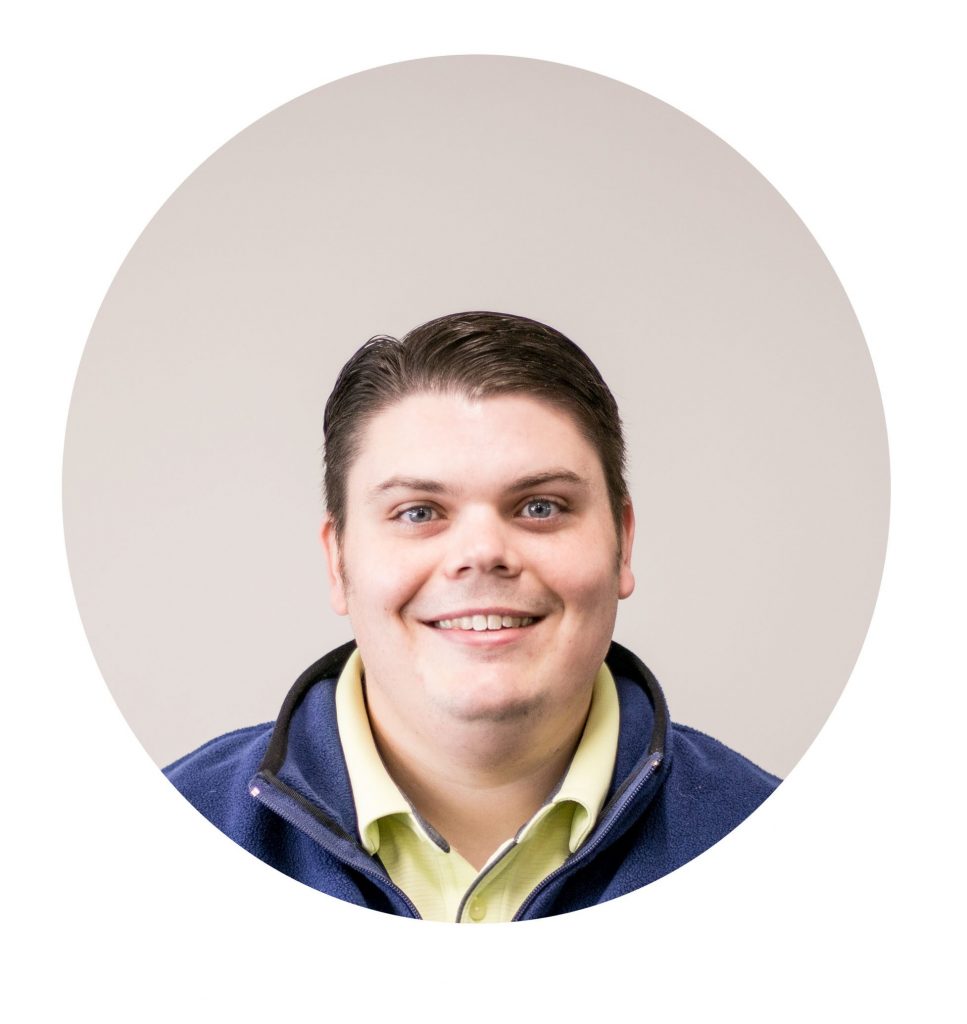
Austin Donahoo is the Mobilization Development Coordinator at World Relief Upstate SC, where he previously served as the Church and Volunteer Engagement Coordinator. He loves integrating his passions for Christian ministry and theology with community engagement, believing that the call of the gospel is to be shown in both word and deed. At World Relief, he works to do this by equipping churches and volunteers to love their refugee and immigrant neighbors.











